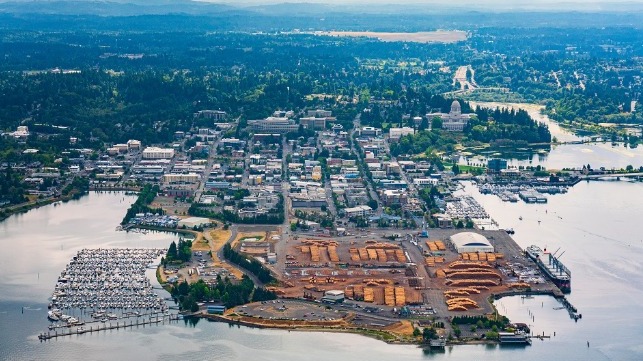Port of Olympia Excels at Handling Unique Cargoes

Unique cargoes require special attention, collaboration and communication, along with the assets and resources to ensure safe and efficient handling. The Port of Olympia prides itself on moving challenging and unique cargoes and has a long track record of success in this field.
As described in The Maritime Executive Magazine in May, the Port of Olympia’s marine terminal is centrally located to serve Puget Sound and the Columbia River Basin, providing ready access to local, regional and international markets. Only one-mile from Interstate 5, ten-miles from the Olympia Regional Airport, and sixty-miles from the Seattle-Tacoma International Airport, make the port an ideal location to handle any breakbulk shipping needs. On-dock rail service is provided by Union Pacific and Burlington Northern Santa Fe railroads with switching service provided by Olympia & Belmore Railroad (a Genesee & Wyoming company). The port’s on-dock 76,000 square foot, open beam construction warehouse facility features eight truck doors with self-leveling ramps, six drive-in doors with spans up to 78 feet wide, and rail siding with a built-in fall arrest system with capacity to handle multiple cars.
The Port of Olympia’s historic primary business has been serving as a log yard for the Japan, China and Korea log export market. Log exports support essential domestic lumber and timber price stability which is crucial for many rural communities in the Pacific Northwest and for the customers exposed to pricing risks. This is sustained by having an alternative for periods with over supply.
At the onset of COVID-19, and during the early shutdowns that included the domestic construction industry, having an export log market provided a profitable alternative when no domestic mill was in operation. As such, the domestic wood price, a driver for so many families in Washington, Oregon, Idaho and Montana, did not collapse.
The Port of Olympia’s operations and maintenance teams and the highly skilled members of the International Longshore and Warehouse Union (ILWU) Local 47 pride themselves in handling the most challenging cargoes. The Port of Olympia is the second largest log exporting port in the Pacific Northwest by volume, averaging 125 million board feet per year, driven by its biggest tenant, Weyerhaeuser. Logs can be challenging to load and provide safety concerns as they are not uniform in size, can roll beneath you, and require lashing for stability at the end of the operation.
Another unique and unusual cargo that has its own set of challenges is the port’s handling of live dairy cattle for export. Dairy farming in Vietnam has increased dramatically as part of their country’s one glass of milk per child per day program. This demand for milk has required more breeding of Holsteins for their higher milk production. As a result, the Port of Olympia has seen over ten shipments of livestock move through the port over the last five years. Each shipment ranges from 1,500 to 2,200 head of cattle along with hay, bedding and feed provisions. The U.S. Department of Agriculture is involved in all steps of this process and have veterinarians overseeing and ensuring the kind treatment and safety of the cattle. Anything that could potentially delay the process could impact the safety of live animals, resulting in a significant challenge. Everyone in Olympia puts the well-being and treatment of the cattle at the forefront of the operation. The Port of Olympia stands alone as the only U.S. West Coast cattle export facility in recent operation.
The Port of Olympia has handled numerous unique cargoes, including locomotives destined for Indonesia, construction equipment from South America, bulk corn from Turkey, gold ore from Ireland, fracking sand in bags from China, heavy lift wind components from Brazil, and steel and aluminum. The port has also handled military cargo and supported long- and short-term layberths. In every situation, the Port has used its depth of knowledge and innovative spirit to ensure the safe and efficient handling of cargo through the port’s logistics process.
Creating a unique partnership that has proven to benefit its customers, the port and ILWU Local 47 approach each customer and cargo as a team. Individuals involved in moving the cargo will be active in pricing and coordinating cargo movements, guaranteeing the customer is the priority. This approach provides a reputation for productivity and trust.
If you are actively pursuing cargo or ship operations and have out of the box needs, consider contacting the Port of Olympia for your solutions. As they say, “Succeed with Us, Choose Olympia.”
This message is sponsored by the Port of Olympia.
The opinions expressed herein are the author's and not necessarily those of The Maritime Executive.
